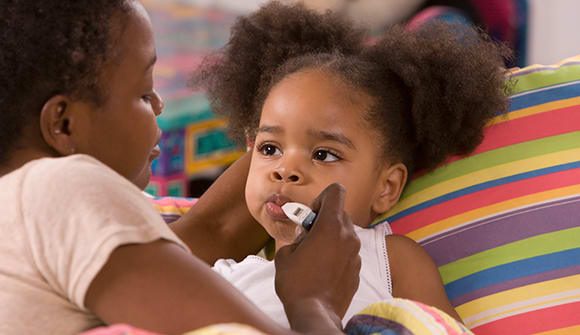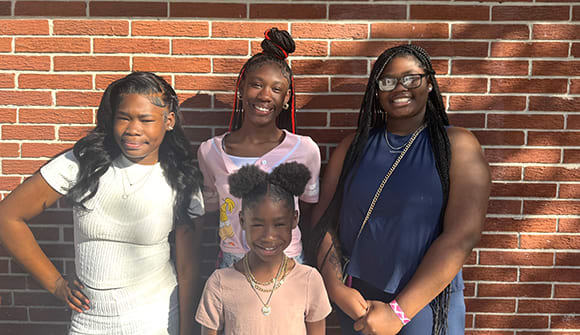How high is too high?
When you should (and shouldn’t) worry if your child has a fever.
Article Author: Juliette Allen
Article Date:

It breaks a parent's heart to see his or her child whimpering, shivering or struggling through a fever. It's easy to fall into panic as your mind races to all the possibilities that could be causing your little one discomfort.
Fevers are one of the most common reasons parents take children to one of Wolfson Children's Emergency Centers, but Brian Gilligan, MD, pediatric emergency medicine physician with Wolfson Children's Hospital and Emergency Resources Group, said not every fever warrants that kind of worry.
Fever 101
A fever is a body temperature of 100.4 degrees or higher, according to Dr. Gilligan. Fevers are most commonly caused by viral or bacterial infections, so when a child has a fever, the most pressing concern is the infection itself, not the resulting fever.
"Our goal with fever reduction is to make the child comfortable and to prevent excessive fluid loss and dehydration," said Dr. Gilligan. "Fever is the body's normal response when we are sick and it also helps with the resolution of viral and bacterial illnesses. Occasionally in children, a rapid rise in body temperature can cause a seizure, known as a febrile seizure. While scary, these are quite harmless and generally do not cause any short- nor long-term problems."
When to worry
The medical response to a child's fever depends largely on age. Dr. Gilligan outlined some key points for parents to determine whether to take their child to the nearest Children's Emergency Center or call/visit the pediatrician.
- Children under 2 months old with a rectal temperature above 100.4 degrees should be taken to the nearest Children's Emergency Center immediately.
- Parents of otherwise healthy children older than 2 months old should call their child's pediatrician's office before heading to the ER.
- High-risk populations, such as children with cancer or sickle cell disease, should come to the ER whenever a fever is above 101 F.
- Unimmunized children under 2-3 years old should be seen by their pediatrician any time they have a fever. Immunizations reduce a child's risk of getting serious, preventable diseases, but if a child hasn't been vaccinated, he or she could be at risk.
- A fever that lasts more than two or three days should be assessed by a pediatrician or, if directed by the pediatrician, the closest Children's Emergency Center.
- If your child has a febrile seizure, please call 911 and get evaluated in the ER.
Dr. Gilligan said that for most children, the response to fever-reducing medication is more telling than the fever itself.
"For example, if a child has a 104.5-degree fever, receives ibuprofen, and 40 minutes later is acting and looking better, I'm not too worried," Dr. Gilligan said. "If the child has a 100.5-degree fever and still looks and acts sick after receiving ibuprofen, I'm more concerned. But parents should trust their instinct and bring their child to the ER if they feel it's a true emergency."
Tips to lower temperatures
Dr. Gilligan recommended parents try lowering their child's fever by giving the appropriate dose of fever-reducing medication, like ibuprofen (Advil®) or acetaminophen (Tylenol®). Your child's pediatrician can recommend the proper dose based on age and weight. Parents can also try dressing their child in loose clothing or giving a lukewarm bath.
"If your child's not responding to fever medication, or if the fever is persisting for two or three days, call your child's pediatrician or take him or her to the nearest Wolfson Children's Emergency Center for evaluation," said Dr. Gilligan.
We're here when your child needs the expert care of pediatric emergency medicine physicians.
Wolfson Children's has Emergency Centers throughout Northeast Florida. To find the nearest one, visit wolfsonchildrens.com/emergency.



